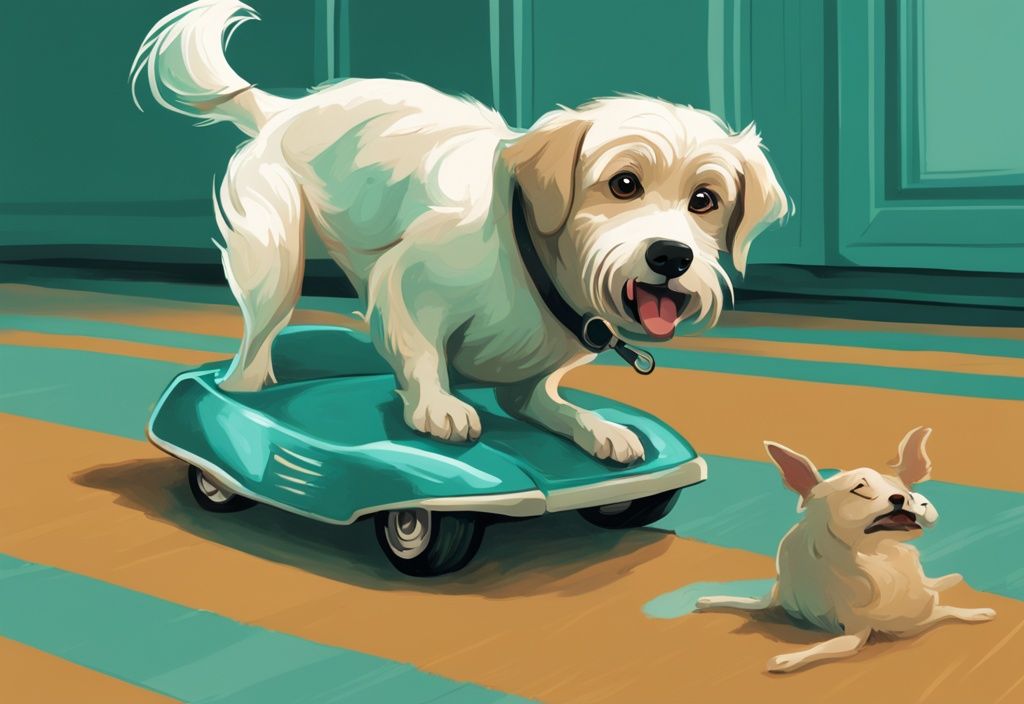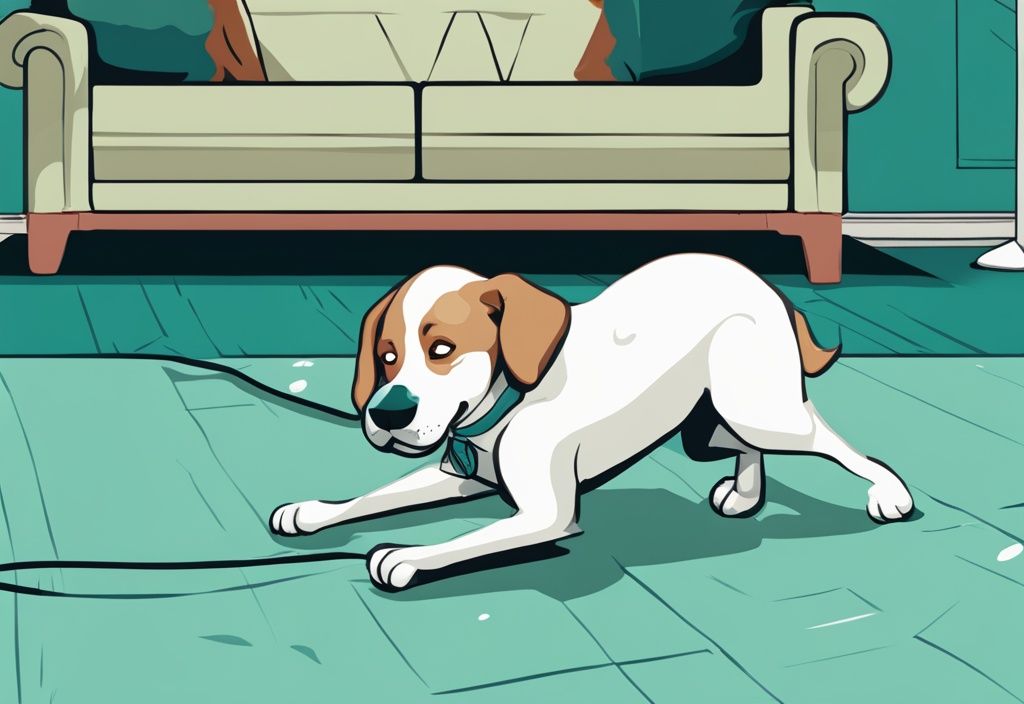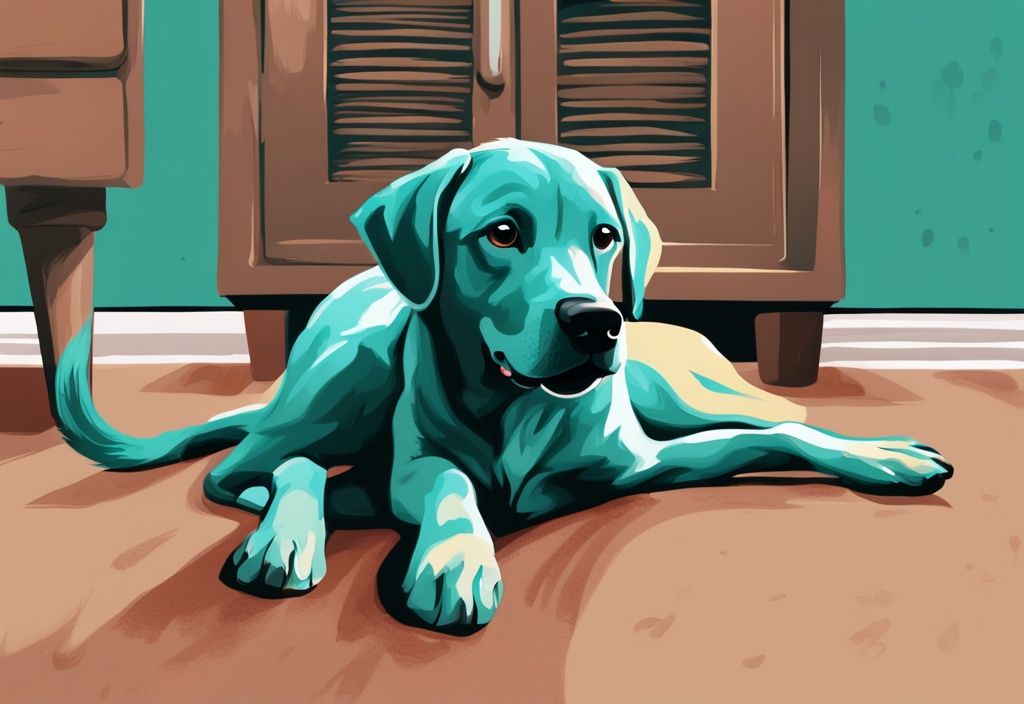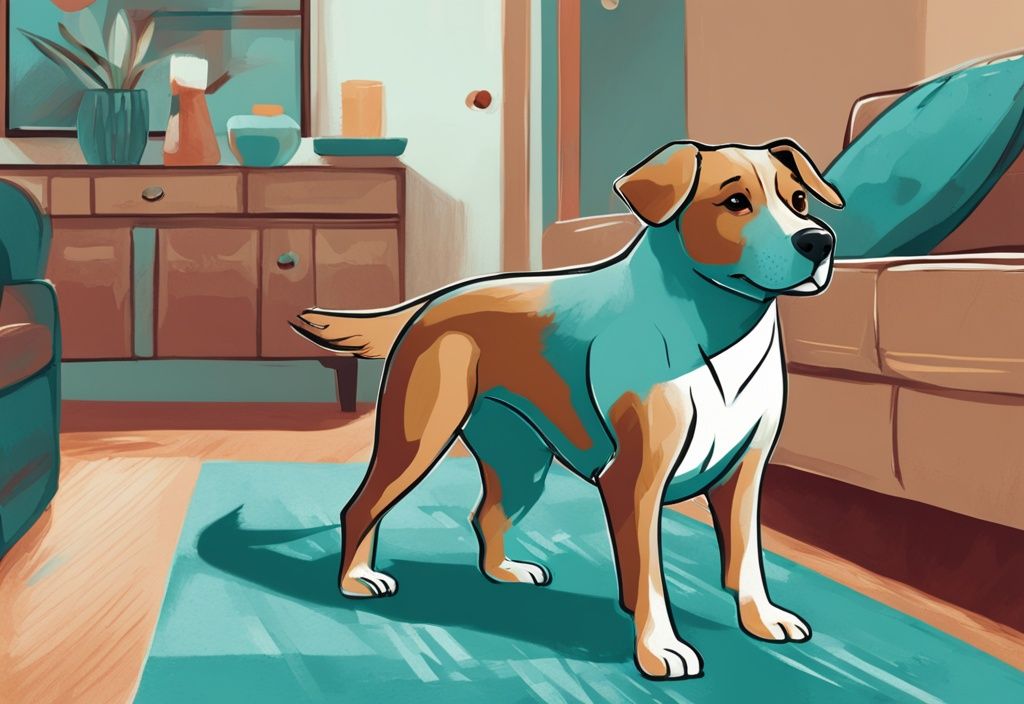Ever caught your dog scooting its butt on the floor and wondered, “What on earth is going on?” Well, you’re not alone! As a fellow dog lover, I’ve been there too, and let me tell you, it’s more than just a funny sight. It’s often a sign of discomfort or health issues that we, as responsible pet parents, need to address.
In this article, we’re going to delve into the various reasons behind dog scooting, from anal gland complications to parasites, allergies, and hygiene problems. Trust me, ignoring it might lead to more severe health concerns for our furry friends.
So, let’s dive in together, shall we? By the end of this, you’ll have practical solutions to keep your dog’s tail wagging with joy and their butt off the floor. After all, a happy pet means a happy home, right?
Common Reasons for Dog Scooting Butt on Floor
Ever caught your pup doing the infamous “scoot” across the living room floor? While it might seem amusing at first, it’s usually a sign that something’s up with your furry friend. Let’s dive into some of the most common reasons why your dog might be scooting their butt on the floor.
Anal Gland Complications
Ah, the mysterious world of anal glands! These little scent markers, tucked away inside your dog’s rectum, can sometimes be a real pain in the… well, you get it. When they’re full or impacted, your dog might feel like they’re sitting on a cactus, leading to the classic scooting behavior. Smaller breeds like Chihuahuas, Miniature Poodles, and Shih Tzus are particularly prone to this issue. If your dog seems reluctant to sit or whimpers during their bathroom breaks, it might be time to check those glands. And if they’re licking or biting their rear end excessively, it’s a sure sign that something’s not quite right back there.
Parasitic Infections
Worms, worms, worms! These pesky parasites can cause some serious itchiness, making your dog scoot their butt on the floor like they’re trying out for a dance competition. Tapeworms are often the main culprits, and you might spot their segments in your dog’s feces or bedding. A quick trip to the vet for a rectal exam will confirm if your pup has any unwanted guests, ensuring they get the right treatment to feel comfortable again.
Allergic Reactions
Allergies aren’t just a human problem! Dogs can suffer from them too, leading to some serious scooting action. Whether it’s food allergies causing skin irritation or reactions to grooming products, fleas, or even contact allergens, your dog might be trying to tell you something. Female dogs, in particular, might scoot due to vulva itching or infections. Keep an eye out for any potential allergens and manage them accordingly to keep your pup itch-free and happy.
Hygiene Issues
Sometimes, the solution is as simple as a clean bum! Hygiene issues are often overlooked but can be a straightforward reason for a dog scooting butt on floor. A dirty bottom after a bathroom break can cause irritation, prompting your dog to scoot in an attempt to clean themselves. Regular grooming and cleaning routines are essential to prevent discomfort and keep your dog feeling fresh and fabulous.
Identifying the Signs of Dog Scooting
Ah, the curious case of dog scooting butt on floor! It’s not just an amusing sight but a signal that your furry friend might need a little extra care. From physical symptoms to behavioral changes, let’s dive into what could be causing this quirky behavior and how to address it.

Physical Symptoms
Picture this: your dog is happily trotting around, and then suddenly, it’s scooting its butt across the floor like it’s on a mission. What gives? Well, there might be some telltale signs that something is amiss. Have you noticed any hair matting around the rear? This could be due to excessive licking or biting. And if there’s swelling or redness near the anus, it might be a sign of irritation or infection. Oh, and let’s not forget the unpleasant odors or fluid discharge, which could point to anal gland issues. These symptoms can make your pup quite uncomfortable. And if you see any bloody discharge, pus, or even a small hole near the anus, it’s time to call the vet pronto! These could be signs of more serious conditions, and we definitely want to keep our four-legged pals happy and healthy.
Changes in Behavior
Now, let’s talk about behavior. Dogs have their own way of telling us something’s up, and sometimes it’s through their actions. If your dog seems reluctant to sit, it might be because of pain or irritation around the anal area. And if there’s whimpering during bathroom breaks, that’s another clue. My Border Collie, Max, once had a similar issue, and it turned out to be a pesky parasite causing all the trouble! If your dog is frequently licking or biting its rear end, it could be trying to soothe itching or discomfort. Whether it’s allergies or something else, keeping an eye on these behaviors can help you decide when it’s time to consult a vet. After all, our pets deserve the best care, and sometimes a little detective work is all it takes to keep them wagging their tails with joy!
When to Consult a Vet for Dog Scooting
Seeing your furry friend scooting their butt on the floor might seem amusing at first, but it can actually be a sign of something more serious. Let’s dive into when it’s time to consult a vet and ensure your pup is as comfy as can be!
Potential Serious Conditions
Oh, the joys of pet ownership! But when Max, my Border Collie, started scooting his butt on the floor, I knew it was time to dig deeper. Scooting can be a dog’s way of telling us something’s not quite right. It might point to issues like anal gland abscesses, perianal fistulas, or even anal gland masses. These conditions sound scary, right? But don’t worry, a vet can help sort them out. If left unchecked, these issues can cause your pooch a lot of discomfort and could lead to more serious problems. And if your dog starts drinking water like it’s going out of style or suddenly needs to pee more often, it might be a sign of anal gland tumors. Yikes! Better to get that checked out pronto. Early detection is key, so your pup can get back to their tail-wagging self in no time.
Urgent Veterinary Concerns
Now, if you spot any alarming signs like bloody discharge, pus, or little holes near your dog’s rear end, it’s time to hit the vet’s office. These could be signs of abscesses or infections that are not just painful but could escalate into bigger health issues. And let’s be honest, no one wants that! If your dog keeps scooting despite your best home remedies, it’s a clear signal that professional help is needed. Persistent scooting could mean there’s an unresolved problem lurking beneath the surface. Getting a vet’s perspective can make all the difference in diagnosing and treating these underlying issues effectively.
Remember, taking quick action can keep your furry friend happy and healthy. After all, isn’t that what every pet parent wants?
Effective Treatments for Dog Scooting Butt on Floor
Ever watched your dog scoot their butt across the floor and wondered what on earth is going on? Well, you’re not alone! This quirky behavior can actually be a sign of underlying issues that need a bit of attention. Let’s dive into some common causes and how you can help your furry friend find relief.

Addressing Anal Gland Issues
Anal gland troubles are often the culprit behind dog scooting butt on floor. Imagine having an itch you just can’t scratch—frustrating, right? That’s how Max, my Border Collie, felt until we figured out the problem. The solution often starts with manually expressing the glands to ease the pressure. But don’t worry, if there’s an infection, your vet might prescribe antibiotics or anti-inflammatories to tackle the swelling and pain. Warm compresses can work wonders too, soothing those irritated spots. In more serious cases, surgery might be needed, but that’s a last resort. Remember, regular manual expression should be done sparingly to prevent dependency or further issues.
Dealing with Parasites
Parasites like tapeworms can be a real pain in the… well, you know where! They can cause significant discomfort, leading to dog scooting butt on floor. Deworming medications are your go-to here, effectively kicking those pesky parasites to the curb. Regular fecal exams are a must for catching these critters early and keeping your pup parasite-free. A proactive approach will keep your dog comfy and happy.
Managing Allergies
Allergies can be another reason for that scooting behavior. They cause itching and irritation, making your dog scoot their butt on the floor like there’s no tomorrow. Managing allergies might mean switching up your dog’s diet to cut out potential allergens. Antihistamines can help ease the symptoms, and controlling fleas is crucial to avoid reactions from bites. In some cases, allergy shots might be suggested to build immunity. Finding and nixing the source of the allergy is key to keeping your pooch itch-free.
Dietary Changes and Home Remedies
Believe it or not, what your dog eats can play a big role in preventing scooting. Increasing dietary fiber can help naturally express anal glands, reducing blockages. Think of it as a little plumbing help for your pup! Homeopathic remedies and natural anti-inflammatories can also support gland function and digestive health. By tweaking their diet, you can help keep your dog’s tush comfy and scoot-free.
Preventing Dog Scooting: Practical Tips
Ever noticed your dog scooting their butt on the floor and wondered why? Well, you’re not alone! This quirky behavior can be more than just a funny sight—it might signal some discomfort. Let’s dive into some playful yet practical tips to keep those furry behinds off the floor and tails wagging happily.
Regular Health Checks
Picture this: a monthly spa day for your dog! Regular health checks are like a little TLC session that can prevent the dreaded dog scooting butt on floor scenario. Just like Max, my Border Collie, loves his belly rubs, your pup will appreciate the attention. Checking your dog’s anal glands is key. You can do this at home or let the vet handle it during a routine visit. Vets are like dog whisperers—they know exactly what to look for and can teach you, too. Catching any issues early means your dog stays comfy and happy, just like Max after his favorite walk.
Maintaining a Balanced Diet
Ah, the power of a good meal! A balanced diet is not just about keeping your dog fit; it’s a secret weapon against dog scooting butt on floor. Think of it like this: the right nutrients are like a superhero cape for your dog’s digestive system. A diet rich in fiber can work wonders, naturally helping those anal glands do their thing without any fuss. Plus, keeping your dog at a healthy weight is crucial—nobody wants extra baggage, right? Just like Whiskers, my cuddly rescue cat, stays agile with the right diet, your dog can too. So, let’s keep those meals nutritious and watch the scooting disappear!

FAQs on Dog Scooting Butt on Floor
Ever wonder why your furry friend might be dragging their bottom across the floor? Let’s dive into the curious world of dog scooting butt on floor. From pesky parasites to simple hygiene hiccups, we’ll explore the reasons behind this quirky behavior and how to keep your pup’s tush happy and healthy.
What makes my dog scoot on the floor?
Ah, the classic dog scooting butt on floor scenario! It’s often due to issues like anal gland discomfort, pesky parasites, annoying allergies, or even infections. These can make your pup feel itchy or uncomfortable. Imagine having an itch you just can’t scratch! That’s why they might resort to a bit of floor surfing to find relief.
Is dog scooting a sign of worms?
Oh, those little wrigglers! Yes, dog scooting butt on floor can sometimes mean your pup has intestinal parasites like tapeworms. These uninvited guests cause irritation and itching, leading to that familiar scooting dance. It’s like having an itch you just can’t reach, and your dog is trying their best to find some comfort.
How can I prevent my dog from scooting?
Prevention is key to avoiding the dog scooting butt on floor conundrum. Regular health checks, a balanced diet, and good hygiene practices are your best friends here. Think of it like a spa day for your pup! These steps help catch any potential issues early on, keeping your dog’s rear end happy and scoot-free.
Is occasional dog scooting normal?
Every now and then, a little dog scooting butt on floor is perfectly normal. It’s like when you have an itch that needs a good scratch. But if your pup is doing it frequently, it might be time for a vet visit to make sure everything is A-OK. After all, peace of mind is priceless, right?
Conclusion
Oh, the curious case of a dog scooting butt on floor! It’s like Max, my ever-energetic Border Collie, trying to moonwalk across the living room. While it might look amusing at first, it’s often a sign that something’s not quite right in the world of our furry friends. This little dance can point to discomfort, and sometimes, it’s a call for a vet’s expertise to uncover the mystery behind it.
Have you ever wondered why your pooch might be doing this? Well, pinpointing the exact cause is key to finding the right solution. After all, we want our dogs to be as comfy as Whiskers, my snuggly rescue cat, who seems to have mastered the art of lounging.
Regular check-ups with the vet are like a spa day for your pup—essential for keeping them happy and healthy. By weaving in some preventive magic, like regular health check-ins and a well-balanced diet, you can help keep this scooting saga at bay.
Understanding the ins and outs of dog scooting butt on floor means you’re well-equipped to take proactive steps. It’s all about ensuring your four-legged buddy stays joyful and content. Isn’t it wonderful how much we can learn and grow alongside our pets? Let’s keep those tails wagging and floors scoot-free!
